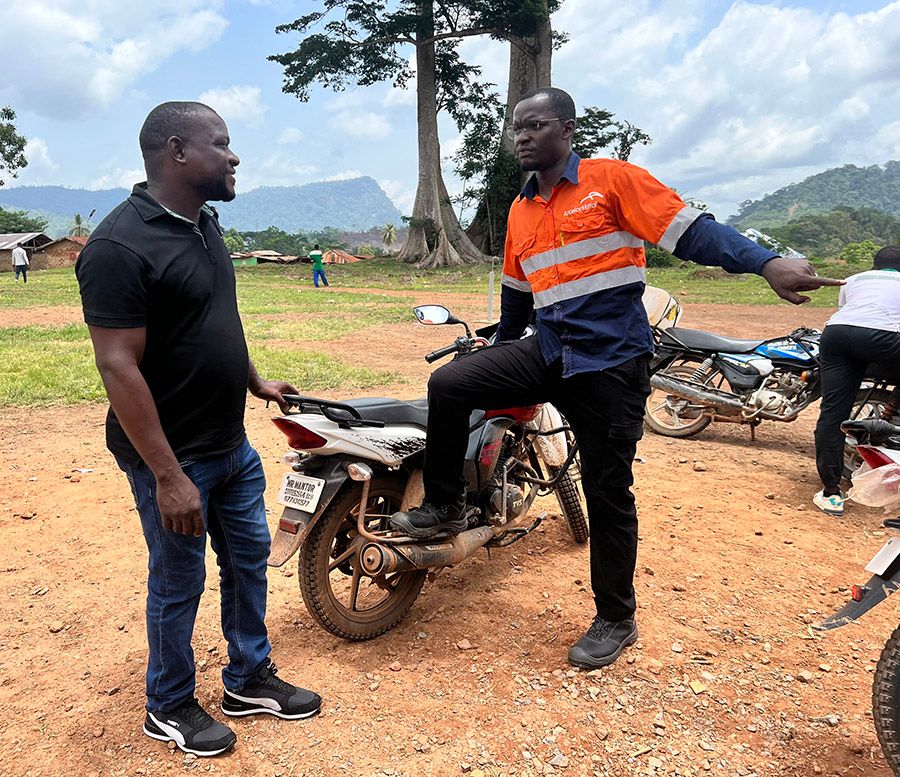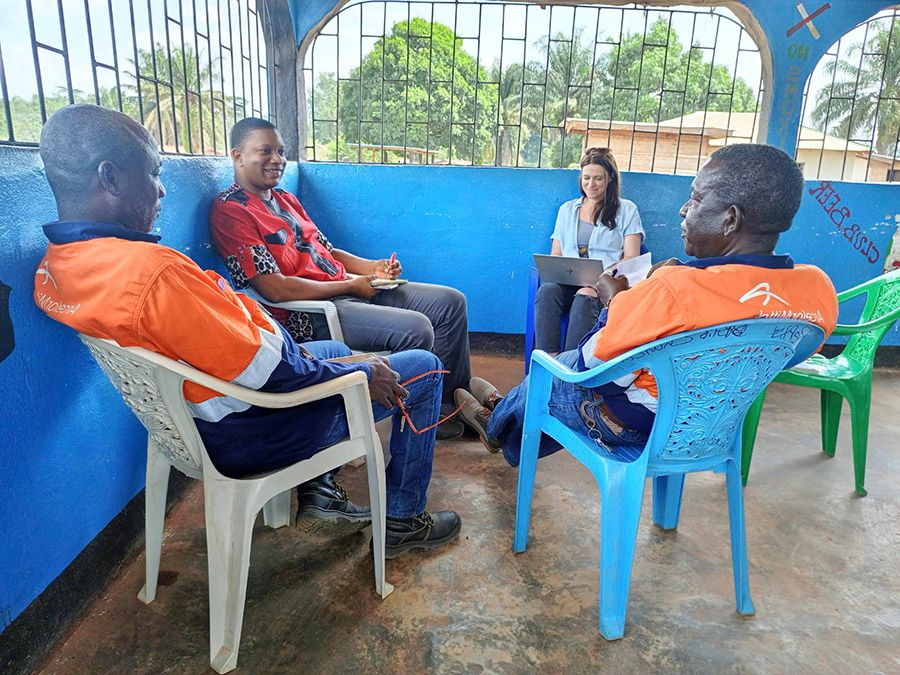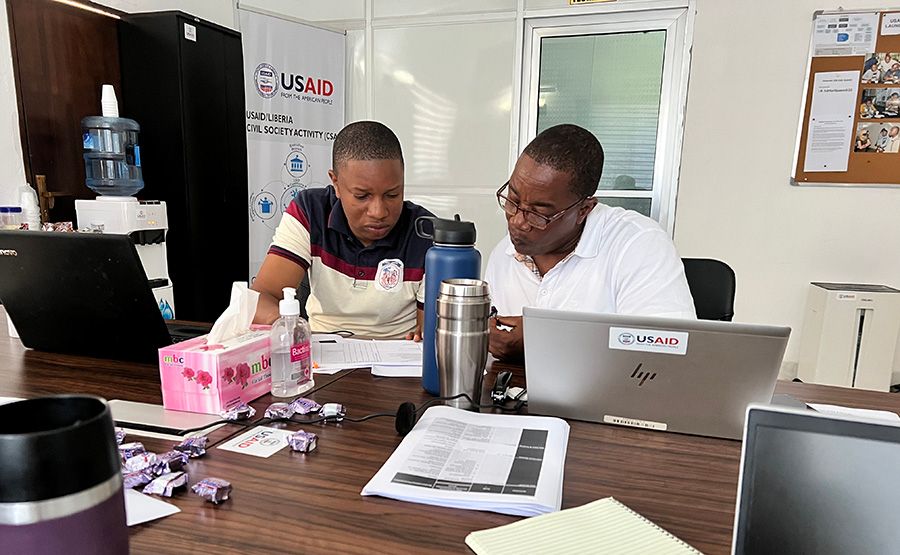Natural resource concessions in Liberia have a long history of overseas influence without due consideration for the welfare of local communities. In 1926, for example, the country granted a 99-year lease to the Firestone Rubber Company for up to 1 million acres. The country’s dependence on Firestone led it to become colloquially known as the “Firestone Colony.”
The concession for Firestone’s rubber plantation left a legacy of exploitation of local communities, creating decades of mistrust toward foreign companies and their government allies. The mismanagement of concessions, land ownership issues, and disputes over the control of natural resources have been recognized as major causes of the Liberian civil war spanning 1989 to 2003. Today, natural resource concessions—historically imposed without consent and with little prospect for local community development—are estimated to cover 40 percent of the nation’s territory.
Recent DAI research into the continued conflict around mining concessions in Liberia reveals the current state of a sector that remains vitally important to Liberia’s economy. As part of the U.S. Agency for International Development (USAID) Liberia Civil Society Activity (CSA), DAI and its partners interviewed more than 100 individuals and conducted a desk analysis of laws and policies around concessions, working within USAID’s Applied Political Economy Analysis (PEA) framework. We found rights violations, unfulfilled commitments by concession companies for community protections and economic development, and disruptions in the social fabric, not to mention loss of livelihoods and environmental and cultural resources.
But we also identified cases of positive deviance and potential pathways to change, offering reasons for hope. Following are six key themes that emerged from our research.

Citizens Lack Mechanisms to Provide Input
Our research examined opportunities for citizen and community engagement in concession decisions, the incentives and disincentives for community participation, and the mechanisms available for seeking recourse. It also assessed community experiences and satisfaction with remediation outcomes.
We found that:
- Decisions are made nationally, with little to no local community consent. Although most companies have committed to the principles of prior consent, implementation varies significantly between companies, concession sites, and even within communities. If communities are consulted, that consultation is typically only with the men;
- Land titles, while they may exist, are not always issued or honored;
- Government officials at all levels are pressured into making agreements that bypass local community input; and
- While citizens have trust in the justice system, companies retain the upper hand as they can afford legal fees and endure drawn-out proceedings.
There are opportunities to address these issues. A revision to the Mineral and Mining Law currently under consideration, for example, may create a mechanism to ensure that prior consent is baked in. To address the high cost of the justice system, CSA is exploring mechanisms to create low-cost or pro-bono legal representation, which could level the playing field for communities in disputes with companies.
Communication Between the Government and Citizens is Limited
Concession agreements, once finalized, are often not properly explained to the affected communities. There is no universal mechanism or procedure consistently implemented to make communities aware of agreements made. Even if agreements are shared, they often are ambiguous and challenging to comprehend. Communities tend to rely on young people or family members working in Monrovia to interpret the legal documents, leading to misconceptions and misinformation surrounding the agreements.
In many cases, political agendas may interfere. District commissioners, town chiefs, and traditional leaders are often swayed by financial incentives to side with the government and concession companies. For example, in Bong County, our research uncovered that elders from four communities adjacent to a concessions site receive $500 per month to support company interests.
Greater community influence could be achieved by engaging young people. Our research found traditional leaders are often more responsive to youth priorities, and concessions companies most concerned with youth unrest. Empowering and involving the youth in decision-making processes can help address the imbalance of power and give communities a stronger voice in matters that affect them. Advocacy for Parliament to review agreements every five years, as required by law, could help benefit the communities and bring the agreements up to par.
Poor Oversight Leads to Poor Enforcement
National institutions such as the Liberian Environmental Protection Agency (EPA) enjoy public trust but don’t necessarily have the capacity to monitor local situations, resulting in accountability gaps and poor enforcement capabilities. In Grand Cape Mount, for instance, the Liberian Environmental Protection Agency (EPA) recommended the resettlement of a community after a chemical spillage occurred in February 2023, affecting the community’s primary water source. The company, however, has thus far refused to comply. Although the EPA made a legally binding decision, there is a lack of oversight and accountability to ensure its recommendations are implemented.
Most alarmingly, the National Bureau of Concessions—whose principal purpose is to monitor and evaluate compliance with concession agreements—reports not having monitored concessions since 2019, leaving them almost entirely unregulated for the past four years. On the other hand, local authorities tasked with conducting various oversight duties hold little power to enforce change, and sometimes are denied access to concession sites. The lack of authority at the county level, combined with weak national-level capacity for oversight, suggests the need for continued civil society advocacy for decentralization of powers around concessions compliance monitoring and enforcement.
Too Many Frameworks and Rules Create Confusion
The ambiguity and complexity of concession agreements terms pose challenges for practitioners and affected communities alike. The overlapping, uncoordinated nature of legislation complicates the regulatory environment for companies and makes it difficult to understand and track community benefits. Likewise, the responsibility for enforcing concession agreements falls to multiple authorities—all of which makes it challenging for communities to hold companies or the government accountable.
Legal frameworks and company obligations are further complicated by the fact that many concessions agreements are decades old. Since they were agreed, various new laws—addressing investment, environmental management, public health, land, labor, the revenue code, and local government—have been created but never integrated into the old agreements.
Ongoing debates and disagreements about how to define “affected community” have also led to inertia and left much-needed development funds unspent. The complex landscape of legal obligations and authorities demands a comprehensive mapping to better understand company obligations, identify gaps, and advocate for solutions. A window of opportunity exists for the program to capitalize on political will to revisit outdated agreements.
Perception of Unfair Practices Leads to Conflict
The most significant conflict flashpoints in communities near concession operations include lack of fair and accessible employment, loss of land and livelihood, environmental damage, beneficiary exclusion, and gender-based violence. Alleging corruption and nepotism in the hiring process, people we spoke to reported that the concession companies often won’t hire them, citing their lack of skills.
The allocation of land for concessions often leads to the displacement of local communities, resulting in the loss of land (often informally owned) available for subsistence farming and in diminished access to essential natural resources. Women, who are the household members primarily responsible for securing food and collecting non-timber forest products, find that these concessions directly impair their ability to provide for their families. These same women are often excluded from decision-making processes regarding concessions and have limited access to alternative ways to earn income.
Lawmakers may take sides, make promises, or incite communities against companies, contributing to instability (a phenomenon expected to be exacerbated in the upcoming election period). Often, the government's assignment of state security forces to protect concession investments results in the dispersal of much-welcomed peaceful assemblies.
Real or perceived unjust exclusion from concessions benefits remains a conflict flashpoint, because affected communities often struggle to receive their rightful share of these benefits. Exacerbating this problem is the lack of formal land titling; without secure land tenure, these communities are vulnerable to exploitation and often unable to assert their rights effectively.
Concession companies recognize all these risks and have an incentive for collaboration to mitigate conflict in places where they operate. Similarly, civil society has an opportunity to support mechanisms such as alternative dispute resolution and multistakeholder platforms, which have shown promise in resolving land disputes, for example. So there is common ground on which to make progress.
Women are Left Out—Or Worse
The exclusion of women from community engagements is a major concern. Our team observed only a small number of women participating in such exercises, and those who did faced ridicule, indicating a pressing need for equitable, gender-specific engagements to ensure that women's voices are heard.
The influx of workers on concession sites alters local power structures in ways that often aggravate existing gender imbalances. In particular, the growth of camps around concessions— housing a predominantly male workforce—creates environments where violence and sexual exploitation are more likely. Women and girls working with concession companies and/or living nearby may be more vulnerable to sexual harassment, assault, or exploitation. Victims are often unwilling to report misconduct due to lack of trust, fear of retaliation, and the generally patriarchal culture. And what few recourse mechanisms they have are not utilized.
Again, we have an opportunity here to help concession holders ensure that company policies are developed and enforced according to international standards for eliminating violence and harassment against women.

Where to Begin
Our research identified several entry points where the Civil Society Activity can most effectively facilitate reform:
- Support civil society coalitions and consortiums to empower communities by raising awareness, providing legal assistance, and advocating for their involvement in concession agreements and renegotiations.
- Address legislative interference and misinformation, especially during the upcoming Liberian elections, by focusing on agreement and benefit mapping, monitoring, and awareness-raising at the county and community levels.
- Establish a civil society task force consisting of a specialized, independent consortium of civil society groups, including environmental, conflict, media, human rights, and legal professionals.
- Buttress the independence of community structures by developing frameworks for operation and for independent monitoring to ensure the compliance of all stakeholders entrusted with protecting community interests.
By raising awareness, leveraging existing opportunities for reform, and exercising greater oversight, civil society can indeed transform the paradigm of concessions for the benefit of Liberians.






